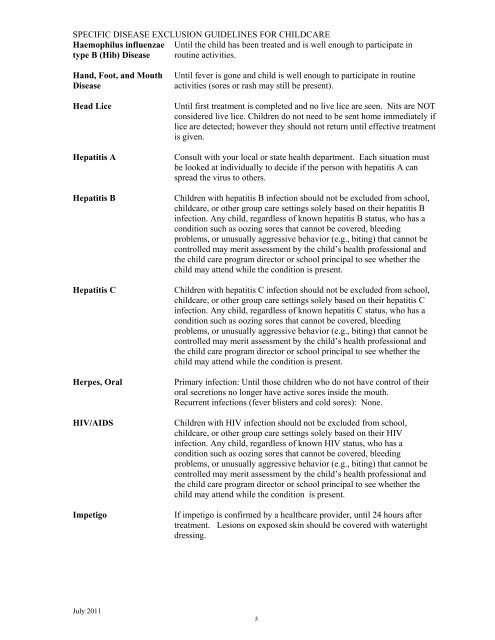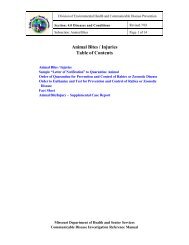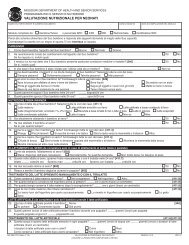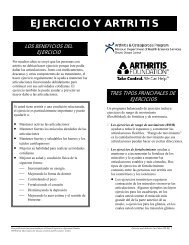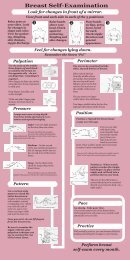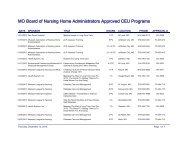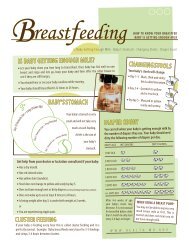Prevention and Control of Communicable Diseases - Missouri ...
Prevention and Control of Communicable Diseases - Missouri ...
Prevention and Control of Communicable Diseases - Missouri ...
You also want an ePaper? Increase the reach of your titles
YUMPU automatically turns print PDFs into web optimized ePapers that Google loves.
SPECIFIC DISEASE EXCLUSION GUIDELINES FOR CHILDCARE<br />
Haemophilus influenzae<br />
type B (Hib) Disease<br />
H<strong>and</strong>, Foot, <strong>and</strong> Mouth<br />
Disease<br />
July 2011<br />
Until the child has been treated <strong>and</strong> is well enough to participate in<br />
routine activities.<br />
Until fever is gone <strong>and</strong> child is well enough to participate in routine<br />
activities (sores or rash may still be present).<br />
Head Lice Until first treatment is completed <strong>and</strong> no live lice are seen. Nits are NOT<br />
considered live lice. Children do not need to be sent home immediately if<br />
lice are detected; however they should not return until effective treatment<br />
is given.<br />
Hepatitis A Consult with your local or state health department. Each situation must<br />
be looked at individually to decide if the person with hepatitis A can<br />
spread the virus to others.<br />
Hepatitis B Children with hepatitis B infection should not be excluded from school,<br />
childcare, or other group care settings solely based on their hepatitis B<br />
infection. Any child, regardless <strong>of</strong> known hepatitis B status, who has a<br />
condition such as oozing sores that cannot be covered, bleeding<br />
problems, or unusually aggressive behavior (e.g., biting) that cannot be<br />
controlled may merit assessment by the child’s health pr<strong>of</strong>essional <strong>and</strong><br />
the child care program director or school principal to see whether the<br />
child may attend while the condition is present.<br />
Hepatitis C Children with hepatitis C infection should not be excluded from school,<br />
childcare, or other group care settings solely based on their hepatitis C<br />
infection. Any child, regardless <strong>of</strong> known hepatitis C status, who has a<br />
condition such as oozing sores that cannot be covered, bleeding<br />
problems, or unusually aggressive behavior (e.g., biting) that cannot be<br />
controlled may merit assessment by the child’s health pr<strong>of</strong>essional <strong>and</strong><br />
the child care program director or school principal to see whether the<br />
child may attend while the condition is present.<br />
Herpes, Oral Primary infection: Until those children who do not have control <strong>of</strong> their<br />
oral secretions no longer have active sores inside the mouth.<br />
Recurrent infections (fever blisters <strong>and</strong> cold sores): None.<br />
HIV/AIDS Children with HIV infection should not be excluded from school,<br />
childcare, or other group care settings solely based on their HIV<br />
infection. Any child, regardless <strong>of</strong> known HIV status, who has a<br />
condition such as oozing sores that cannot be covered, bleeding<br />
problems, or unusually aggressive behavior (e.g., biting) that cannot be<br />
controlled may merit assessment by the child’s health pr<strong>of</strong>essional <strong>and</strong><br />
the child care program director or school principal to see whether the<br />
child may attend while the condition is present.<br />
Impetigo If impetigo is confirmed by a healthcare provider, until 24 hours after<br />
treatment. Lesions on exposed skin should be covered with watertight<br />
dressing.<br />
5


